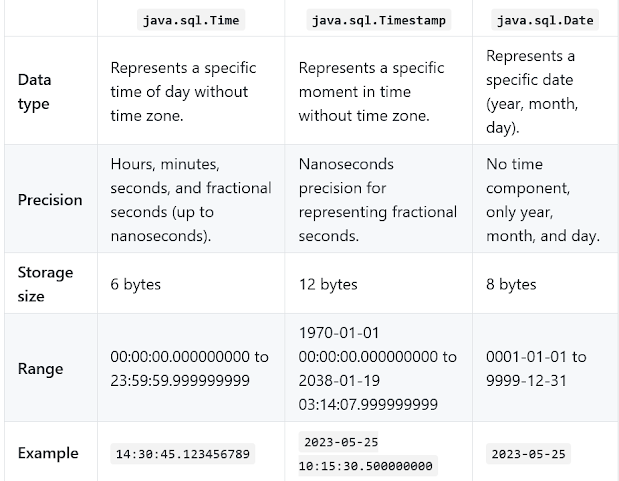Difference between java.sql.Time, java.sql.Timestamp and java.sql.Date is the most common JDBC question appearing on many core Java interviews. As JDBC
provides three classes java.sql.Date, java.sql.Time and java.sql.Timestamp to
represent date and time and you already have java.util.Date which can
represent both date and time, this question poses a lot of confusion among Java
programmer and that’s why this is one of those tricky
Java questions are tough to answer. It becomes really tough if the differences between them are not understood correctly.
We have already seen some frequently asked or common JDBC questions like why JDBC has java.sql.Date despite java.util.Date and Why use PreparedStatement in Java in our last tutorials and we will see the difference between java.sql.Date, java.sql.Time and java.sql.Timestamp in this article.
By the way apart from these JDBC interview questions, if you are looking to get most from JDBC you can also see 4 JDBC performance tips and 10 JDBC best practices to follow. Those articles not only help you to understand and use JDBC better but also help with interviews. Let’s come back to different SQL time, timestamp, and SQL date.
We have already seen some frequently asked or common JDBC questions like why JDBC has java.sql.Date despite java.util.Date and Why use PreparedStatement in Java in our last tutorials and we will see the difference between java.sql.Date, java.sql.Time and java.sql.Timestamp in this article.
By the way apart from these JDBC interview questions, if you are looking to get most from JDBC you can also see 4 JDBC performance tips and 10 JDBC best practices to follow. Those articles not only help you to understand and use JDBC better but also help with interviews. Let’s come back to different SQL time, timestamp, and SQL date.
Difference between java.sql.Time, java.sql.Timestamp and java.sql.Date:
JDBC in Java has three dates/time types corresponding to DATE, TIME and
TIMESTAMP type of ANSI SQL. These types are used to convert SQL types into Java
types.
1) First difference on java.sql.Time vs java.sql.Timestamp vs
java.sql.Date is about information they represent :
JDBC TIME or java.sql.Time represents only time information e.g.
hours, minutes, and seconds without any date information.
JDBC DATE or java.sql.Date represents only date information
e.g. year, month, and day without any time information.
JDBC TIMESTAMP or java.sql.Timestamp represents both date and
time information including nanosecond details.
2) java.sql.Time and java.sql.Timestamp
extends java.util.Date
class but java.sql.Date is independent.
3) Time information from java.sql.Date and Date
information from java.sql.Time is normalized and may be set to zero
in order to confirm ANSI SQL DATE and TIME types.
And, if you like to see difference in tabular format, here is a nice table which highlights the difference between Time, Date, and Timestamp in Java SQL API
 So the difference between Time, Timestamp, and Date of SQL package is clear in
terms of what they represent. On the contrary java.util.Date also
represents Date and time information but without nanosecond details and
that's why many people prefer to store date as a long value (millisecond passed
from epoch January 1, 1970 00:00:00.000 GMT). If you compare to java.sql.Timestamp with equals() the method it will return false as value of nanosecond is unknown.
So the difference between Time, Timestamp, and Date of SQL package is clear in
terms of what they represent. On the contrary java.util.Date also
represents Date and time information but without nanosecond details and
that's why many people prefer to store date as a long value (millisecond passed
from epoch January 1, 1970 00:00:00.000 GMT). If you compare to java.sql.Timestamp with equals() the method it will return false as value of nanosecond is unknown.
That's all on the difference between java.sql.Date, java.sql.Time and java.sql.Timestamp. All
differences lie in what exactly they represent. These kinds of questions are
worth looking at before going to any JDBC interview as time and date are integral
parts of any JDBC interview.
Other JDBC and SQL articles from Javarevisited Blog












2 comments :
2) java.sql.Time and java.sql.Timestamp extends java.util.Date class but java.sql.Date is independent.
This point is INCORRECT.
All three types java.sql.Time, java.sql.Timestamp , and java.sql.Date are extended from from java.util.Date (http://docs.oracle.com/javase/7/docs/api/java/util/Date.html)
Hello @Peddi, you are absolutely correct, all three date and time classes from java.sql package e.g. Time, Timestamp, and Date extends java.util.Date but more importantly they violate Liskov substitution principle, hence cannot be used in place of each other. For example, you cannot pass java.sql.Timestamp to a method expecting java.util.Date even though Timestamp contains both date and time part.
Post a Comment